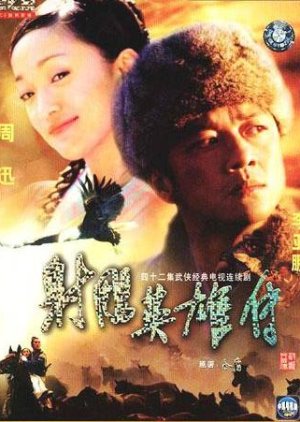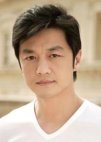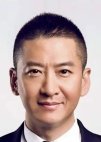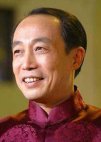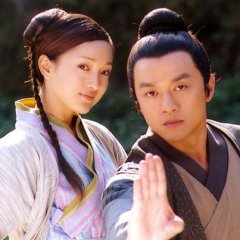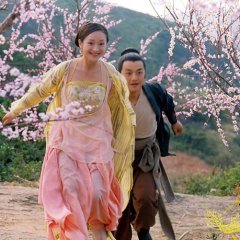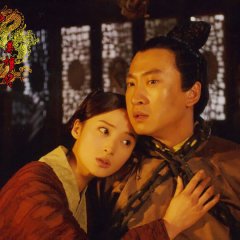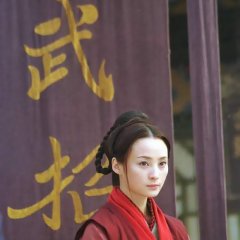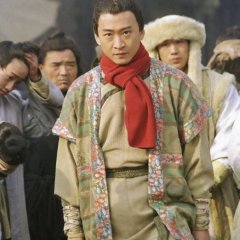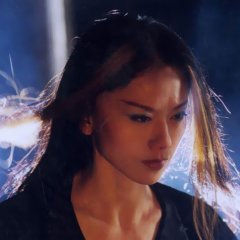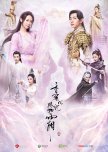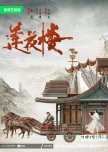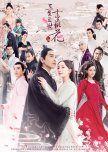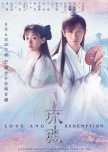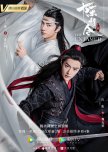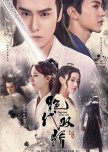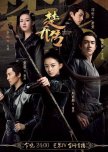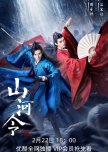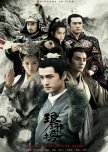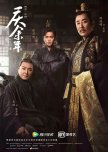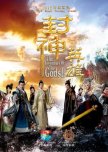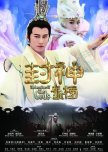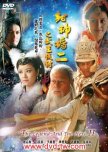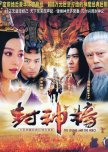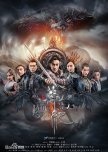Dos dedicados jóvenes de la dinastía Song, Yang Tie Xin y Guo Xiao Tian, descubren que sus esposas están embarazadas. Se prometen mutuamente que, cuando nazcan sus hijos, se convertirán en hermanos jurados o hermanas juradas (si ambos son del mismo género) o se casarán si fueran de diferentes géneros. Una noche, se hacen amigos de un sacerdote taoísta llamado Qiu Chu Ji de la Secta Quan Zhen que es buscado por los soldados del Imperio Jin. Qiu Chu Ji es testigo de los soldados que vienen a arrestarlo y escapa al ver aparecer una señal de su Secta en el cielo nocturno. La bondadosa esposa de Yang, Bao Xi Rou, rescata a un hombre herido que resulta ser el príncipe de Jin, Wanyan Hong Lie. Cuando los soldados de Jin regresan, las dos familias se ven obligadas a separarse. Wanyan Hong Lie lleva a Bao Xi Rou a la capital de Jin, mientras que Guo Liping es llevado por un codicioso soldado de Jin, Duan Tian De, a las afueras de Mongolia. Ambas mujeres creen que sus maridos perecieron tratando de salvarlas. Al descubrir la desaparición de sus amigos, Qiu Chu Ji promete encontrar a sus hijos y enseñarles artes marciales para que puedan vengar el mal hecho a sus familias. Siguiendo la pista de Duan Tian De, Qiu Chu Ji "se hace amigo" de los 7 'Bichos Raros' de Jiangnan. A cambio de ayudar a Qiu Chu Ji a encontrar a las dos mujeres, hacen una apuesta amistosa. Al encontrar a los niños de Yang y Guo, cada lado le enseñará a los niños a encontrar sus estilo de artes marciales. En el cumpleaños número 18 de ambos niños, todos se reunirán y los dos se batirán en duelo. El resto de la serie describe las pruebas y tribulaciones que sufrieron los dos hijos. Guo Jing, el hijo de Guo Xiao Tian, crece en Mongolia bajo la protección de Genghis Khan. Yang Kang, por otro lado, crece como un príncipe en el Imperio Jin. (Fuente: English = DramaWiki || Traducción = flytosky at MyDramaList) ~~ Adapted from the novel "The Legend of the Condor Heroes" (射鵰英雄傳) by Jin Yong (金庸). Edit Translation
- Español
- English
- magyar / magyar nyelv
- dansk
- Título original: 射雕英雄传
- También conocida como: Legend of Eagle Shooting Hero , Legend of the Arching Hero , She Diao Ying Xiong Zhuan , 射雕英雄传 ,
- Director: Kuk Kok Leung
- Guionista: Zhang Ting, Lan Xiao Long, Shi Hang
- Géneros: Romance, Wuxia
Dónde ver Legend of the Condor Heroes
Reparto y créditos
- Li Ya PengGuo JingPapel principal
- Zhou XunHuang RongPapel principal
- Zhou JieYang Kang / Wanyan KangPapel principal
- Jiang AngelMu Nian CiPapel principal
- Sun Hai YingHong Qi Gong / "Northern Beggar"Papel principal
- He QingBao Xi Ruo [Yang Kang's mother]Papel secundario
Reseñas

However, this review was written with the hope that this version will receive more positive attention, as it was certainly deserving of it, being an earnestly and beautifully produced and directed show which did the fantastic saga justice.
Plot:
Story-wise, this was one of the most faithful to the saga in the novels. It was also relatively well-executed. Hence, the plot, story and execution were the strengths of this adaptation. However, it was not without flaws as the show focused on certain parts of the story more than others, resulting in an imbalance (as per the story in the novels). If one was not too nit-picky, that was still one shortcoming which can be overlooked.
Particularly worthy of note was the period while the story was based in Mongolia. There was more emphasis on this phase of Guo Jing’s journey in this version than there were in the others, and the care taken were admirable. If there was an absolute I dare assert with regard to the adaptations, it was that the 2003 version had the best Mongolia-based-phase out of all existing adaptations, no ifs-or-buts about it. It was truly fantastic, even with the inevitable flaws.
Cast/Acting:
There were many criticisms and controversy with regard to the casting, especially for the main leads. However, while everybody had their own preferences for actors/actresses and their interpretations of the characters, personally, I found the acting and interpretations to be solidly competent and robustly interesting. I loved the Huang Rong and Guo Jing here. The only main issue I had was with Yang Kang and his actor, whom I thought overacted most times. The rest of the cast also did very well and left a deep impression. I particularly appreciated the presence and gravitas some of the more veteran actors and actresses brought to the secondary characters, especially the more major characters of the wuxia masters.
Action sequences/CGI:
While there were some annoying overuse of CGI, overall, I thought the usage was appropriate for the scenes they were employed in, and did not unnecessarily overshadow the more traditional kungfu moves during the same action sequences.
Cinematography:
The cinematography here was simply breathtaking, with shooting locations spanning the breadth of China from the north to the south, giving a sense of deep realism to this version that moved me. In tandem with that touch of realism, the framing used also brought out the ethereal aesthetic of a black and white ink painting in many scenes, lending many scenes a sense of immersive beauty.
This version used a palette of muted and darker colours for its scenes, lending a dirtier, grittier and more epic feel to the whole show, which really matched the wuxia genre, I thought. Not only that, it lent a tinge of tragedy and bittersweetness throughout. While the story was a somewhat positive exposition on the journey of a patriot-hero, it was also a story littered with deaths and tragedies, and I applauded the show for not shying away from this sense of sadness through its visual presentation.
Costumes:
The costumes and set pieces utilised here could be considered simple and drab, but were actually custom made for the show based on historical records and the novels, and here too, the effort to be true to its source material and historical background was clearly shown.
Music:
While the tracks used here would have their work cut out for them in topping the nostalgic impact of the TVB adaptations’ theme songs, I never once thought it paled in comparison. The opening theme song, “Heaven and Earth Are in My Heart” was a marvelously epic encapsulation of the whole ‘hero’ journey, and the ending song, “True Love is Beautiful” was a lovely sentimental ballad which could well ensnare your audio senses. The musical score employed throughout the show was also suitably impressive - compositions which were predominantly classical Chinese instrumentals - elevating the impact of many scenes.
Conclusion:
This was the least pretty adaptation so far, with an intensity and realism that made it a more plodding viewing compared to other versions. However, it was the one which I thought captured most concisely the essence of the saga as written in the novels - from story, acting, backdrop, feels, props to cinematography - which was essentially a distillation of the idealisation of Confucian values through the epic journey of Guo Jing. Hence, this version resonated deeply with me, and has remained my favourite out of all the ones I have had the pleasure to watch. It was truly a masterpiece worthy of its source material.
Choices:
If dark, gritty and epic is your cup of tea, the 2003 version is highly recommended.
If a slightly revisionist-story, specific/well-known actors/actresses and general prettiness are your preference, the 2008 version might be a good choice.
If bright, pretty, romance-weighted and ‘idol-ish’ are your preferences, the latest 2017 version would be a fine choice.
If a good story, wonderful acting, memorable OST, nostalgia and simple curiosity (as to why they were such beloved classics), the early-1980s TVB/HK-versions are a must.
The 1994 remake from TVB would also be a solid choice. Good acting and overall lovely drama. (This was the series where I first fell in love with the saga and characters, and a well made adaptation which did not veer off too much from the source material. Sometimes, first love doesn’t always leave the most lasting impression, and I am glad for that).
Yang Liping's Mei Chaofeng is the best to date
I've got to be honest that this is the version of LOCH that I like the least for many reasons. I have watched 5 versions and this one is my least favorite.Let's start with what I like.
It manages to deliver the epic storytelling of the sage. The Mongolian steppes as well as the people. Hustle and bustle of city life in the south. Pretty authentic.
The music really suits the theme of the drama. It brings out the sense of chivalry and patriotism, which is what it's all about. I especially love the music that accompanies the presence of Mei Chaofeng. It's beautiful and haunting at the same time.
The kung fu's choreographed really well. Really badass. Love it!
But what I love the most is the rendition of Mei Chaofeng by Yang Liping. It's the best! I was mesmerized. I was always looking forward to her appearance when I was watching the drama. Her Nine Yin White Bone Claw is terrifying but so beautifully choreographed. Her expression is cold without excessive make-up. There's a sense of terror, eeriness, and deep melancholy whenever she appears. It may be an unpopular opinion but one of my favorite characters in LOCH is Mei Chaofeng. Despite her ghost-like or witchlike appearance I sincerely sympathize with her. At the moment I'm reading the second book "A Bond Undone" where I get to explore her backstory and I become more and more sympathetic towards her and her tragic story. I hope they will make another adaptation which is longer so that her story can be included. Although LOCH 2003 has the best Mei Chaofeng of all the adaptations, but it still depicts her as a mere evil martial artist. The story of this badass female martial artist deserves a segment in the coming adaptation if there is.
Other than Yang Liping, I also like the actress who play Huang Rong and Mu Nianci. They did well too. Both Zhou Xun and Jiang Angel did justice to the character they played.
Now what I don't like.
In my opinion, some of the actors who played the main male characters were miscast. Li Yapeng for example. He looked to old to play Guo Jing. Guo Jing is said to be about 18 year old when he begins his adventure in jianghu. And Li Yapeng didn't suit to play the part as he looked too mature for the role. He did really well as Linghu Chong but I don't thing he did as Guo Jing. The actors who played Huang Yaoshi and Yang Kang, I don't think they're suitable for the part. Huang Yaoshi is my favorite characters in LOCH along with Mei Chaofeng and Hong Qigong. But the actor who played Huang Yaoshi here didn't have what it takes to be Huang Yaoshi.
And the costume, I just hate it. It's as if they were too lazy to think of what to put on the actors, picking up random costumes out of nowhere. The hairdo on Guo Jing and Yang Kang makes them look much older that they're supposed to be.
The makers of the drama seemed to want to aim a more gritty storytelling, but I don't think it worked. I read that the producer was the same person who had made "Laughing In the Wind". I love Laughing In The Wind. It's probably my top tier wuxia drama. Sombre tone works well with Laughing In The Wind. The story itself is just dark. Heavy conspiracy. Almost no funny moment there. But LOCH has more comedic moments. Gritty tone doesn't go well with LOCH.
In short, I wouldn't watch this version again for a very long time. And if I do, I would do it for Yang Liping's Mei Chaofeng. She's the best Mei Chaofeng hands down.

